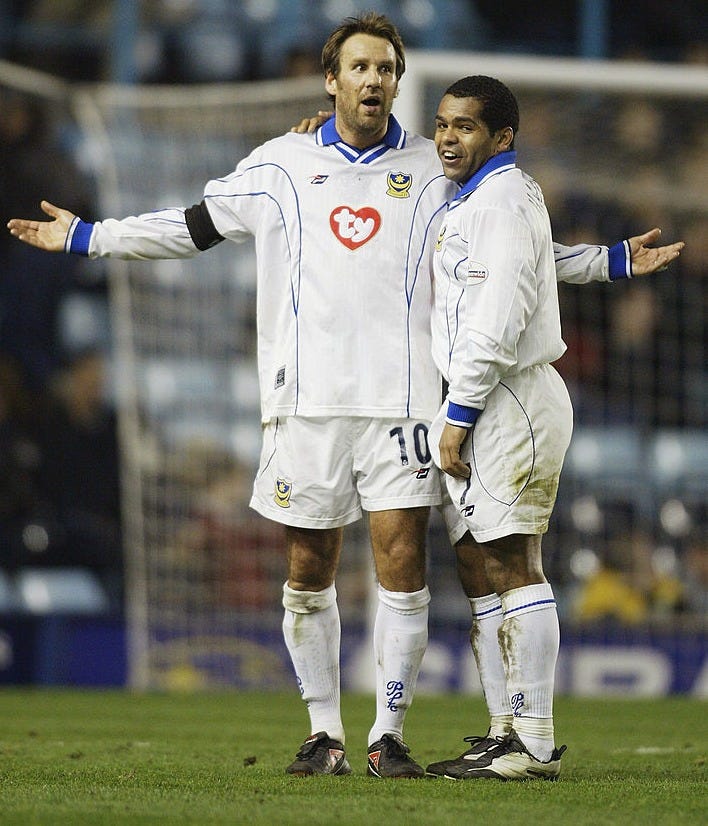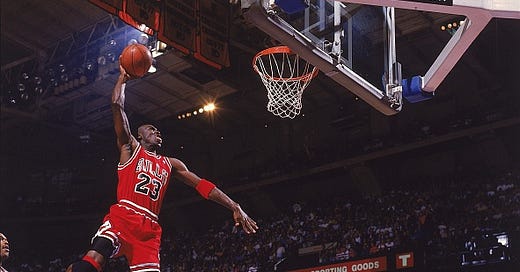In My Sporting Hero, a new podcast series from Nutmeg, footballers talk about the athletes who inspire them. Sometimes those sportsmen and women are also footballers. Sometimes not. You can listen to the audio on this post, on the podcast app of your choice (just search for ‘My Sporting Hero’) or enjoy the written version below.
Our next guest is Kevin Harper. Kevin was a talented winger for Hibernian during the 1990s, before playing for Derby County, Portsmouth and Stoke City, and represented Scotland at Under-21 and ‘B’ levels. He finished his senior playing days at Dunfermline and has since embarked on a coaching career that included a stint as manager of Albion Rovers. His is a prominent voice in the conversation around racism in football.
Kevin’s sporting hero is Michael Jordan, widely regarded to be the greatest basketball player of all time.
As a kid, I played football all the time, but Michael Jordan was my real icon. I was into the Air Jordan trainers, but his desire to win meant everything to me, as a black kid growing up in a white world. I didn’t have any Scottish sporting heroes who were black. And Michael Jordan transcended basketball in so many ways.
He wasn’t the biggest, he wasn’t the strongest, but he carried the team on his shoulders and had the drive to make other people better; that always stood out for me.
Growing up in a poor area, I didn’t have Sky, so I didn’t see Jordan play often, but the little bits that I did get to see were just inspirational. As I got older and was able to watch basketball, I devoured any Jordan content. He made me a basketball fan.
The things he could do with a basketball just made me smile. I loved hearing him speak because although he had that burning ambition to win, he also came across as such a nice, humble guy. He never boasted about being the best, even though other people said that he was. Instead, he would mention other people, such as Kareem Abdul-Jabbar and Kobe Bryant.
I read his book, watched documentaries on him and grew to understand what he was about. He looked after himself physically and was always willing to take responsibility.
His achievements were due to this huge desire to be the very best - I don’t think that a lot of people are able to capture that within themselves. As a black person growing up, I had doubts that I could be the best that I could be – in any walk of life, because I genuinely believe that it is more difficult for black and ethnic minority people to get to the very top; we have to work harder than our white counterparts. That’s just the way the world is, unfortunately. But to see a black person such as Michael Jordan - or indeed Michael Jackson - become so successful was inspiring, and people will be still talking about them 100 years from now.
Mark Walters is probably the main reason I believed that I could make it in the footballing world. The racial abuse that he received in professional football in Scotland was nothing short of a disgrace. When I was playing football as a nine, 10, 11-year-old and getting racially abused, I just thought it was normal. The irony is that I naively believed that when I went to the professional level, it wouldn’t be racist. I appreciate that society was very different back then, but it’s awful to think that such behaviour was considered acceptable.
The way Walters played his football, despite it all, says a huge amount about him. He was getting bananas thrown at him, but remained such a humble person and never retaliated. That was probably the biggest reason to think, ‘yeah, I can get through this’, because there were times during my football career that I didn’t think I would.
As a young kid and then going into the professional game, there was no assistance, nobody to turn to. And when I looked at Michael Jordan lording it over the whole of America, and probably the whole of the world, and then I looked at Mark Walters who was a sensational footballer, it helped me. But when I step back and I look at the hardships that you go through, and the trauma that you go through, I don’t always think it was worth it. Ultimately, that’s what God put me on this earth for: to play football. And thankfully, through His wishes, it got me to where I needed to be.
Michael Jordan left every single ounce of effort on the basketball court. Once, he came off his sickbed and scored the highest points total in a finals game. That takes sheer determination and pride - knowing that you’re the leader of this team and they have a better chance with you playing. What a boost that must have given his team-mates.
I knew I wasn’t the best player in the team… but I was an important cog
I believe that you’re a cog in the team, and in all the best teams, the cogs work perfectly in sync. I also believe that everyone in the team should be a leader of some sort. However, it must have been difficult for Jordan’s Chicago Bulls teammates in the sense that they would always know that they were inferior to him. Yet they deserve credit for accepting that reality, and instead looking at it positively, knowing that he would drive them forward and make them better.
When I was at Portsmouth and we won the league, I knew I wasn’t the best player in the team by any stretch, but I was a cog in that team - and an important one. Paul Merson was the leader of that team, and he had an ability that the others didn’t, but we had to work to allow him to realise that ability. And it was the same with Jordan, because if his teammates don’t get the ball to him, he’s not going to be able to do his thing.

Michael never made it all about himself. It was all about the team. It didn’t matter to him if it was Scottie Pippen who got the basket. If someone was in a better position, he would pass to them. Yes, internally it was all about him - about him being the best that he could be, but on the court it was all about sacrificing for the team; and in training it was all about driving people who weren’t as good as him to have a mentality like him.
With mavericks, there’s always a bit of give and take. I’m sure Ronaldo and Messi will have had times when their managers were lenient on them, and that’s fine - I think other players understand that. Because somebody like that can change a game in an instant, and that’s what a manager wants. You’ve got lots of people who are the same, but you need to have that sprinkling of magic dust, and that’s what Michael Jordan had.












Share this post